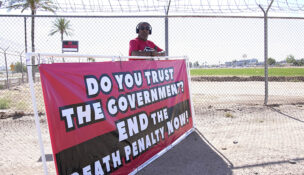Foes argue ballot measure doesn’t protect tipped workers
Howard Fischer, Capitol Media Services//August 14, 2024//[read_meter]
Foes argue ballot measure doesn’t protect tipped workers
Howard Fischer, Capitol Media Services//August 14, 2024//[read_meter]
A bid by the Arizona Restaurant Association to convince voters to let them pay their workers less is so misleading that it should not be allowed on the ballot, according to an attorney for foes.
James Barton is telling the Arizona Supreme Court they should block Proposition 138 from going to voters. And the key, he said in new legal filings, is that it is being sold as the “Tipped Workers Protection Act,” the title proposed by restaurant owners and incorporated into the measure by the state lawmakers who agreed to put it on the ballot for them.
Only thing is, said Barton, if it is approved it actually would mean restaurants could pay their tipped workers even less than they do now. And that, he said, is sufficient reason for the justices to stop it now, before it ever gets to voters.
“The court has the power to intercede on the people’s behalf when a fraud on the electorate is being perpetrated,” Barton said.
He actually made the same arguments before, only to be rebuffed by Maricopa County Superior Court Judge Peter Thompson, an appointee of the former Gov. Jan Brewer, who ruled there is nothing inherently misleading about the measure. And the trial judge said that it could be construed that it does protect tipped workers, as providing financial relief to restaurants actually could allow them to keep more of them on the job.
Barton, however, told the justices that they need to stay focused on not some economic theory but instead what the measure actually would do.
Under current law, workers are paid $14.35 an hour, a figure that increases annually to account for inflation. But it also permits employers to pay their tipped workers as little as $11.35 – $3 an hour less – as long as their total pay, with tips, hits the minimum.
What Prop. 138 would do is increase that credit to 25% of the minimum wage. So, at the current $14.35 an hour, that reduces the cost to the restaurant at just $10.76.
Steve Chucri, president of the Arizona Restaurant Association, said no one will take home less than they do now. He pointed out that the 25% allowance for owners is available only if a worker brings in tips equal to at least $5.59 an hour, bringing him or her up to $2 an hour above the minimum, or $16.35.
But what that also means, Barton said, is if the worker brings less than the $5.59 in tips he or she gets the current $11.35 – leaving the worker no better off than now.
Barton said he is not arguing that the title of Tipped Workers Protection Act implies that there is some sort of promise that there would be an increase in the minimum wage.
“But it implies or promises that it will provide protection to tipped workers,” he said, something he said it does not do.
The challenge by Barton is being brought by Raise the Wage AZ. That is the group that collected signatures asking voters to hike the minimum wage by $1 an hour this coming January and another $1 in January 2026.
It also would have phased out that $3-an-hour tip credit.
The Arizona Restaurant Association sued. And proponents of what would have been Proposition 212 conceded that it probably did not have enough valid signatures. That ended that fight.
But the restaurants also went on the offensive, convincing their GOP allies in the Legislature to put Prop. 138 on the ballot, the one with the 25% tip credit. That led to Raise the Wage filing its own lawsuit over what Barton says is that misleading title.
Barton lost the first round earlier this month when Thompson threw out the case. And at least part of that was based on the question of what, in fact, is the “title.”
The judge said the official title actually is “Amending Article XVIII by adding Section 11, Constitution of Arizona.”
The Legislature itself also added an official descriptive title: Permits employer to pay up to 25% less than the minimum hourly wage for employees whose compensation includes tips or gratuities from patrons, but only if the employer can establish that the employee ultimately received the minimum wage plus $2 for every hour worked.
Barton called all of that irrelevant, saying the fight isn’t over whatever is the “official title.”
The key, he said, is that the lawmakers, at the behest of the Restaurant Association, added verbiage to the measure, saying “This act may be cited as the ‘Tipped Workers Protection Act,’ ” making it an integral part of Prop. 138. And Barton said that while lawmakers have the right to create unofficial titles, “it cannot be done in a deceptive manner.”
But that still leaves that economic argument by restaurants that Barton and Raise the Wage AZ will have to face.
The Arizona Restaurant Association, in seeking to keep Prop. 138 on the ballot, argued there actually is a way of reading it to support their contention that decreasing what they have to pay tipped workers actually would be good for those workers – that lower labor costs would create what the industry called an “economically sustainable minimum wage requirement for employers.” And that, the association says, will “prevent elimination of tipped workers’ jobs because of additional, statutory-imposed business costs.”
Thompson said that was enough of an argument to allow the issue to go to voters.
“The political views of whether the goal of tipped worker protection is best accomplished by adopting or rejecting the proposed amendment should not be conflated with rejection of the proposed amendment before it even appears on the ballot,” the judge wrote.
The Supreme Court is likely to decide whether the measure remains on the ballot soon.

















